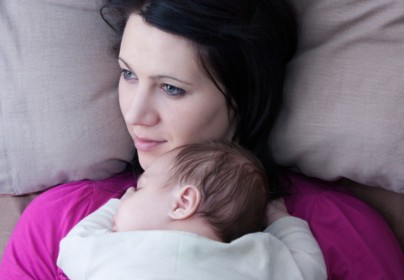Some women diagnosed with baby blues may have a different problem
It may sound like every new mother’s ultimate fantasy to shed kilos just weeks after giving birth. But what may be envied at the local parenting class could in fact be a sign of post-partum thyroiditis, leading to anxiety, irritability, heart palpitations and extreme fatigue.
As many as one in 10 Australian women may suffer such problems after pregnancy. Dannii Minogue was one. The tiny-framed celebrity appeared to be the ultimate yummy mummy after giving birth to baby Ethan, now two. But her post-baby body was not the result of a fad diet or rigorous exercise; Minogue was battling a thyroid condition that left her so tired she could barely lift her newborn.
“Women are quite often told it is the baby blues, but a lot are misdiagnosed,’’ says Professor Creswell Eastman, a leading endocrinologist from Westmead Hospital in Sydney. “If their GP is not on the ball, they think, ‘Here is another women not coping with her child.’ But these women have a significant disorder.”
All about the thyroid
The thyroid is a bow-shaped gland that sits at the base of the neck. It releases a hormone that controls the body’s metabolism. Following pregnancy, the gland can become inflamed, causing an autoimmune condition.
Many symptoms are similar to those of postnatal depression. However, a simple blood test will show if there is a thyroid hormone imbalance.
Post-partum thyroiditis can present in a number of ways, and it can occur after any pregnancy – not just the first.
In many cases, a women will first develop hyperthyroidism, where the gland is overactive. This usually occurs between one to six months after giving birth. It causes weight loss, anxiety, a racing heart, sleeping problems, excessive tiredness and intolerance to heat.
Thyroid function may recover or briefly return to normal before entering an underactive phase. Known as hypothyroidism, this can cause weight gain, fatigue, depression, aching joints and intolerance to cold.
For most women, thyroid function will eventually return to normal. But for some the problem will persist.
Pregnancy screening
“Every pregnant woman needs to be screened for thyroid function,’’ Eastman says.
Many women who are never diagnosed and get better on their own are at serious risk of having problems in their subsequent pregnancies.
An underactive thyroid in the mother has been linked to development delays in newborns. Those with sub clinical hypothyroidism, a borderline condition that can develop in the wake of post-partum thyroiditus, are three times more likely to have a miscarriage and four times more likely to suffer pre-eclampsia.
Even if they do not have any more children, up to 30 per cent may go on to develop hypothyroidism in later life.
Why does it happen?
Scientists are unsure what causes post-partum thyroiditis.
It is not linked to a lack of iodine, which is common in other thyroid disorders. However iodine needs are higher during pregnancy and Beverley Garside, president of the Australian
Thyroid Foundation, says research shows 70 per cent of pregnant women are iodine deficient.
It is recommended that all pregnant women take a supplement of 150 micrograms a day (higher levels should be avoided, as too much iodine is harmful to babies).
Research has suggested post-partum thyroiditis may be linked to smoking. It is also thought that some cases may be an aggravation of a low-symptom immune problem that existed before pregnancy.
I thought the fatigue was normal as I had a new baby
Sylvia Dlugosz, 31, was diagnosed with hypothyroidism when pregnant with her eldest daughter Ellie, now two.
“It was a surprise because I had no symptoms. I was put on medication but was told to stop three months after giving birth. I became so tired. Even though the fatigue was terrible, I thought it was normal because I had a new baby. After a follow-up blood test I was put back on the medication and I felt like a completely different person. My doctor assured me the hypothyroidism hadn’t been at a level that could affect my baby’s IQ and development, which had worried me.”
Source: bodyandSoul
 We are sharing information for knowledge. Presented by. SocialDiary.Net
We are sharing information for knowledge. Presented by. SocialDiary.Net



